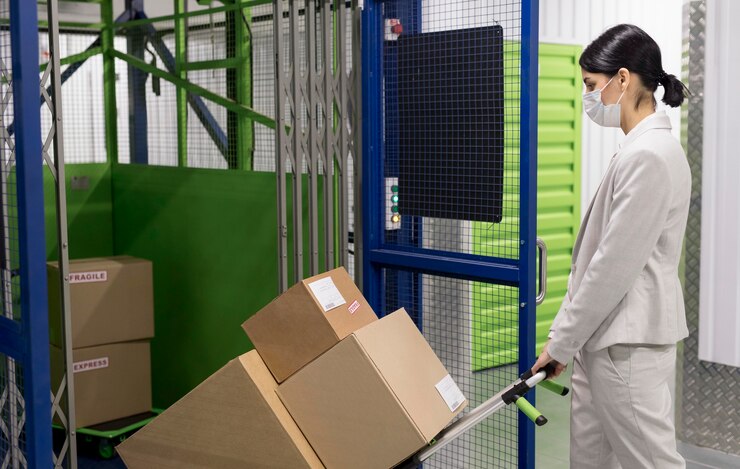Transforming Waste Management with RFID: A Complete Solution Guide

Strong 8k brings an ultra-HD IPTV experience to your living room and your pocket.
This is an ever-changing industry that follows the principles of more efficient, cost-effective, and sustainable waste management practices. Waste volume in the world has been increasing every year, and traditional methods are not able to catch up with growing demands for precise tracking, optimized routes, and reduced environmental impact. This is innovative as regards issues related to RFID waste management solutions. RFID can be the source for the waste management firms and local governments in the simplification, error reduction, as well as accountability improvement in their entire system.
Understanding RFID Technology in Waste Management
What is RFID?
RFID stands for Radio Frequency Identification and is a technology that relies on the use of electromagnetic fields to automatically identify and track tags attached to objects. RFID tags are fitted with a microchip and an antenna, which enables the tag to send a signal to the reader to communicate. RFID can be used in waste management by applying it to containers, bins, and vehicles for real-time tracking and data collection.
How RFID Works in Waste Management
RFID tags in waste collection are typically affixed on top of the bins or dumpsters. The RFID reader is mounted on the rear of the waste collection vehicle. Every time a bin is collected, the RFID reader captures details about the pickup, including date and time, location, and bin type. This information is broadcast to a central database. Waste management companies as well as local governments can then access the information of a particular bin, its utilization patterns, and usage history.
This information enables waste managers to monitor
Collection time Amount of waste being produced in a particular location Actual pickup record-based billing accuracy Proper disposal of hazardous or regulated materials Benefits of RFID Waste Manage
- Collection time
- Amount of waste being produced in a particular location
- Actual pickup record-based billing accuracy
- Proper disposal of hazardous or regulated materials
Benefits of RFID Waste Manage
ment Solutions
1. Increased Operational Efficiency
The important advantage of RFID Waste Management Solutions is optimizing collection routes. Common and traditional waste collection routes tend to be fixed along standard schedules and sometimes include unnecessary pickups of empty or low-volume bins. With RFID, the real-time data about bin fill levels can optimize the collection route, save on fuel, reduce operation costs, and decrease carbon footprint.
2. Enhanced Data Accuracy and Accountability
RF provides the accuracy of all the data obtained from the process of waste management. All the bins record their activity, therefore the transparent record for every pickup and drop-off. Misreporting induces error which is reduced, much like the errors associated with handling these in a traditional system, while still offering a detailed reporting to the customer, regulator, as well as internal stakeholders. Reliability increases when customer billing and compliance with regulations on waste are concerned.
3. Reduced Operational Cost
Preventing massive cost savings for waste management companies is one of the advantages of RFID Waste Management Solutions. This is by eliminating unnecessary trips and optimizing route management. With fewer trips, fuel consumption and maintenance for the collection vehicle will be minimized. Besides, the times lost due to the non-location of bins or even their theft are minimized through this technology. It might end up being a very costly problem for most waste management companies.
Less manual data entry is also reduced due to automated tracking, and therefore labor costs will remain low.
4. Increased Sustainability and Reduced Carbon Footprint
RFID technology encourages optimum waste management strategies. Optimized collection patterns reduce the number of truck travels and, by consequence, lower emissions. Furthermore, more accurate measurements of quantity tracked assist in better recycling and disposal procedures, which are less likely to contribute to landfill stockpiles.
5. Improved Customer Service and Transparency
With the use of RFID-based waste management, customer interactions are more transparent. Collection times, locations, and even the amount of waste are some of the accurate data that can be given to the customers for greater transparency. This will enhance trust and satisfaction because the customers will be assured that they will only be billed on the actual services received.
How to Implement RFID Waste Management Solutions: Step-by-Step Key Steps
1. Needs assessment and setting of objectives
RFID technology needs to be evaluated first in the needs of your organization. These will outline the goals, be it cost-cutting, sustainability, and/or improvement in customer service. After setting clear goals, one can now establish how the technology should be implemented.
2. Choose the right tags and readers
There are passive and active RFID tags, and the waste management most often utilizes the passive kind since it is cheaper and lasts longer. The RFID tags that you will select must be applicable on your bins and tolerant of environmental situations in your locality. Like the RFID readers, there are types for functionalities; for this purpose, ensure that you get the right models that will work hand in hand with your specific set-up, whether hand-held, fixed mounted, or mobile-mounted.
3. Integration with Existing Waste Management Software
RFID technology generates massive amounts of data. It will make sure that data processing and analysis are fluent, if it is integrated into the existing waste management software. Most modern software platforms for waste management are easy to integrate with RFID systems which can facilitate data consolidation, reporting, and analytics.
4. Educate employees and Train customers
Training is an important part of proper implementation. Train your employees on the proper handling of RFID tags, readers, and the functions of the softwares. Teach the customers on the system change and how it's going to impact service quality. The training of the stakeholders makes the whole process of transition easier and also helps in having an appreciative view of the new technology.
5. Monitoring and Fine-Tuning the System
After implementing the RFID Waste Management Solutions, monitor the performances of the system in a systematic manner. Track some of the KPIs on cost savings efficiency in the operations, and customer satisfaction. Alter the problems faced to improve the system as well as the performance outcomes.
Implementation Problems RFID Waste Management Solutions
RFID Waste Management Solutions have a very high initial investment.
The initial investment will be on tags, readers, software integration, and most importantly, staff training. Still, the long-term benefits often outweigh this investment; in fact, the upfront expenses may be what hinders smaller waste management companies or municipalities with limited budgets.
Data Security and Privacy Concerns
Like any system that collects data, RFID technology raises privacy and security concerns. Customer information is sensitive, as is operational data. Measures must be taken to prevent unauthorized access of such data. The encryption and possible access controls along with data storage need to be proper.
Environmental Factors
Weather, rough handling, and other environmental challenges all can affect RFID tags. The choice of durable, weather-resistant tags is important for their long-term reliability and longevity.
Future Trends in RFID Waste Management Solutions
As RFID technology advances, waste management will grow to more complex solutions. Among the trends expected are integration with Internet of Things and Smart City Initiatives, where device integration with Internet of Things features is now part of some RFID waste management systems and real-time monitoring of fill levels and bin conditions.
Better Data Analytics and AI: The data will be processed using Artificial Intelligence with the RFID systems to identify patterns; collection will thus be optimized even further. Predictive analytics will then help in predictive maintenance, and resource utilization.
Green Initiatives and Recycling Optimization: Future RFID Waste Management solutions would probably include more innovative capabilities in sorting for better recycling processes and reduced contribution to landfills.
RFID-Based Hazardous Waste Verification: Certain RFID systems would have RFID Verification for hazardous or regulated waste tracking to meet the safety and environmental standards. It would provide proper follow-up information on the waste disposal with more accuracy and avert potential hazards.
Conclusion
Therefore, adopting RFID Waste Management Solutions means that the waste management has made an important milestone. More advancements in and availability of the technology will additionally lead to increased application of RFID in waste management, offering a window to investigate an increasingly challenging phenomenon. In innovations like RFID verification of sensitive materials, the potential of RFID technology will inspire efforts toward more intelligent and environmentally friendly waste management practices.
Note: IndiBlogHub features both user-submitted and editorial content. We do not verify third-party contributions. Read our Disclaimer and Privacy Policyfor details.







